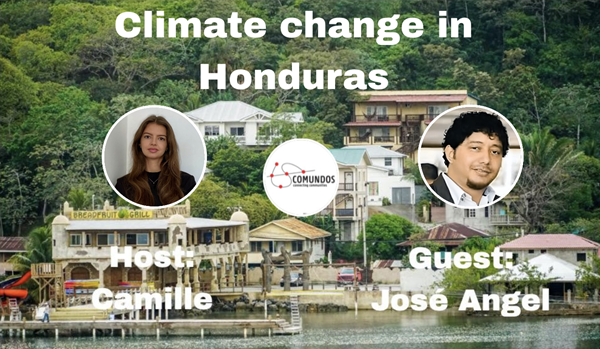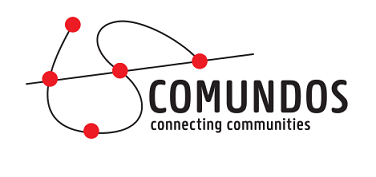Episode 10: Climate Change in Honduras
In this episode, we reconnect with José Angel from Honduras, who first shared his story on climate change back in 2017. Honduras, a country rich in biodiversity but highly vulnerable to climate impacts, continues to face serious environmental challenges. We catch up with José to explore how the situation has evolved, what progress has been made, and what urgent steps are still needed to protect both nature and communities. Here is his story from 2017.

Transcription:
Host:
Hello, I’m Camille and welcome to the podcast of Comundos where we reconnect with storytellers from around the world who once brought their voices to life through our digital storytelling workshops. I’m joined today by José Angel, who lives in Honduras, and he made a story back in 2017. Together, we’ll be diving into his story on climate change in Honduras. With its rich biodiversity and vulnerable geography, Honduras has long been on the frontlines of climate impacts, facing everything from hurricanes to droughts. Now, eight years later, we catch up with José to find out: what has changed, how the situation has evolved, what new challenges or solutions have emerged, and much more. José, it’s a pleasure to have you with us. Welcome to the podcast!
Guest:
Hi everyone, my name is José Angel Artica Garcia, I’m 39 years old, I live in Jacaleapa, Honduras. I currently work as a teacher and I have a master’s degree in human resources. I really appreciate your invitation to be here in this podcast and I hope I can answer your doubts about the story.
Host:
You’re more than welcome. So, the first question is: what was the climate situation like at the time of making the climate change story?
Guest:
I could say that at the time I decided to record the story, the climate in Honduras was changing. Winter began to arrive later, causing farmers to lack enough water for their crops. In Jacaleapa, my hometown, we have always suffered from water shortages during the dry season and lack drinking water service. So, I saw a valuable opportunity for a storytelling initiative through the Comundos network to raise awareness by showing what is being done wrong and generating a change in people's mindsets. Part of the problem is people's erroneous practices, to name a few, for example farmers burning to prepare farmland, shifting cultivation, deforestation, the use of chemicals, poor management of solid waste, and, of course, the lack of awareness among the population about caring for the environment.
Host:
And what changes have there been since then to date?
Guest:
Truth be told, no significant changes have occurred since then, but environmental protection measures have been implemented. There are more protected areas, logging has been banned in some places, and forest fires have been combated. The army is in charge of our reforestation program, and approximately 200 hours of environmental protection are required for graduation in schools.
Host:
That is very impressive. What are the options to solve the problem?
Guest:
Let's say that the options we have are to raise awareness among the population about the care of natural resources, eliminate practices that harm the environment, implement new technologies and cultivation techniques such as: organic farming, hydroponic crops, use of wastewater for agriculture, reduction of chemicals in crops, and more state policies that favor the environment.
Host:
Those are great ideas, but since then do you think the government or local communities have become better prepared to deal with climate change?
Guest:
In fact, local governments are not fully prepared, but they do have a better understanding of climate change due to the high temperatures during this dry season, for example. In some parts of Honduras, educational institutions have had to modify their schedules or suspend classes from noon to 3 p.m. because the heat is too stifling. We could say that measures have been taken, but there is still a lack of environmental stewardship across all local governments and at the national level as well.
Host:
Climate issues can sometimes feel overwhelming, how do you think journalists and educators can make the topic more engaging for people?
Guest:
Journalist and educators in Honduras have played a key role in raising awareness about climate change, acting as information and training agents. Through print, radio, television, and digital media, reporters have highlighted the effects of climate change in the country, such as prolonged droughts, more intense hurricanes, biodiversity loss, and diminishing water resources. They have also denounced human practices that exacerbate these phenomena, such as deforestation, forest burning, and pollution, which has generated public pressure to take corrective measures. For their part, educators have incorporated environmental content into the school system, teaching children and young people the importance of caring for nature, reducing their ecological footprint, and adapting to climate challenges. Through projects such as school gardens, recycling, reforestation campaigns, and science fairs, ecological action has been encouraged from an early age. The combination of journalistic work with environmental education has been fundamental in raising critical awareness among citizens, motivating both reflection and active participation in protecting the planet. This joint effort has helped more Hondurans recognize the urgency of taking action against climate change.
Host:
That is very true. From what you've seen, are young people in Honduras becoming more aware of the climate crisis? And how do they react?
Guest:
As I said before, local governments are not fully prepared with action plans to counteract environmental damage. While it's true that central governments have taken measures, it's still not enough to reverse years of environmental abuse. I previously explained how journalists and educators have done their part to raise awareness about environmental damage, and because of that, Hondurans understand that urgent measures must be taken. This is a positive point. But climate change is also causing job losses in the countryside, and many people have had to migrate, either from the village to the city or directly to another country, such as the United States, Spain, France, among others, because natural resources and land no longer produce at the same level as in previous years. This is why it is so urgent that we take care of the environment because it has even caused migration in these countries.
Host:
That’s a beautiful insight. Thank you so much for joining us today and for sharing your experience. It’s clear that while the climate may be changing fast, awareness and resilience are growing too.
Guest:
Thank you for the invitation. I really enjoyed sharing my experiences.
Host:
You are more than welcome. Well, that’s it for today’s episode. If you enjoyed this conversation, share it with a friend, and remember: the stories we tell can shape the world we build. Until next time!
A gift for Comundos
Over the years, Comundos has helped remote communities around the world by teaching critical thinking, media literacy and the use of communication technology.
To do this effectively, we need your support for computers, translations, courses and social media management.
Thank you .
BE11 1030 2973 8248




